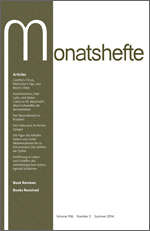|


|

View Online Edition
Subscribe Online
Activate Your Subscription
Sign up for email updates
Editorial Board
Back Issue TOC's
Advertising Rates
Artwork Guidelines
Index/Abstracts
Recommend Monatshefte
Submission Guidelines
Monatshefte 2017 Subscription Rates
Libraries & Institutions:
print & online $230
online only $198
Individuals:
print & online $90
online only $75
Non U.S. Postage (no postage charges for electronic only subscriptions)
Airmail: add $40/yr.
Canadian Subscribers: add 5% GST. |
Monatshefte
Volume 88, Number 3, Fall 1996 Table of Contents
Texts and Documents
Irmgard Elsner Hunt
Drei neue Gedichte
Irmgard Elsner Hunt, born in Silesia in 1944, is not a newcomer to Monatshefte; she was featured, together with Richard Exner, in 1991 (vol. 87, pp. 4-6) with both a short prose piece and a poem. Apart from numerous texts—mainly poetry—which have appeared in journals and anthologies over the years, she authored an early volume of poems, Schwebeworte, which came out in 1981. More recently, Hunt published her Pazifische Elegie (1988) and a collection of short stories, Hier. Auf der Erde (1991). Her “Drei neue Gedichte” are printed here for the first time. (RG) (In German)
Articles
Klaus L. Berghahn
Ende des utopischen Zeitalters? Ein Vorwort
Jürgen Fohrmann
From Literary Utopia to the Utopia of Subjectivity
Abstract:
This essay analyzes the dualistic structure (reason and non-reason) of literary utopias during the early modern period. It then shows that the focus on reason disappears in several texts of the eighteenth century. From this point on, utopia can be concerned with the questions: (a) how is a complex utopian society conceivable; (b) how is a complex human being conveyable within it? The essay points out that “individuality” is regarded to be the concept which promises a solution. (JF)
Claudia Brinker-von der Heyde
Ein Staat des Friedens im Angesicht des drohenden Weltendes: Die Newe Wandlung eines christlichen Lebens des Hans Hergot
Abstract:
Obviously in response to the cruelty of the ruling class, which dashed the peasants’ rebellion to the ground, Hergot outlines the model of a world-wide empire, based on an agrarian and communist economy. Proceeding from the Christian ideal of a corporate life without individual possessions, there arises a highly controlled confederation, ruled at the top by God the Father himself. The certainty that the world would end very soon suggests the necessity that this state be formed, as it is known from the chiliastic tradition. Utopian models are used. The interest of the author, however, does not focus on his fictitious narrative, but on the prophecy of a final condition which will eventually be realized at some time and place. (CBvdH) (In German)
Wynfrid Kriegleder
David Christoph Seybolds Reizenstein: Der erste deutschsprachige Roman über die amerikanische Revolution
Abstract:
David Christoph Seybold’s epistolary novel Reizenstein. The History of a German Officer (1778–79), the first extensive fictional treatment of the American Revolution in German literature, deals with a group of young Germans who build a classless “arcadia” in South Carolina by restoring a way of life no longer possible in corrupt, luxurious, and virtueless Europe. Their private utopia becomes a model for the emerging United States when the eponymous hero, a general in Washington’s army, forces Congress to accept a radical constitution, which creates an agrarian communist state completely cut off from Europe. The novel does not come to terms with its ultimate contradiction: The “democratic” utopian constitution it favors will ultimately destroy the paternalistic arcadia it espouses. In this regard Seybold’s Reizenstein points forward to a number of nineteenth-century German “America novels.” (WK) (In German)
Tamás Lichtmann
Reisen in historischen und imaginierten Zeiten und Räumen: Utopie und Satire in Jura Soyfers Theater
Abstract:
Journeys, discoveries, utopias are usually themes of epic works; seldom are they genre- determining elements in drama. In the theatrical pieces of Jura Soyfer, the travel motif becomes a thematic and world-view core which determines their plot and structure. All the journeys presented in his dramas contain a fictional and a utopian trait: the trips are undertaken either backwards in time (Lechner Edi...), in timelessness (Vineta), in empirical and fantastic space (Der Weltuntergang), in grotesque-fictional spacelessness (Astoria), or in a historical time (Broadway-Melodie 1492). This article deals with three pieces by Soyfer which reveal a close connection in motifs and form a kind of virtual dramatic trilogy. In Der Weltuntergang the world is threatened with annihilation, and in Vineta the annihilating catastrophe has already occurred, while Astoria does not exist in reality but merely as a fictitious quasi-reality. The dreamlike vision of time and place in these works determines the unique character of Jura Soyfer’s small artistic pieces within the Viennese cabaret scene. (TL) (In German)
Personalia 1996
Introduction, German Departments in the U.S.A., German Departments in Canada, Promotions, New Appointments, Visitors, Retirements, Necrology, Doctoral Dissertations, Summary
Book Reviews
|




